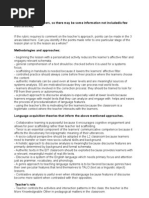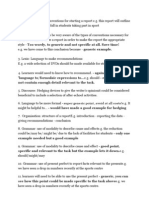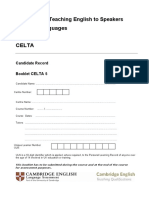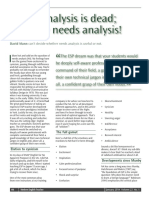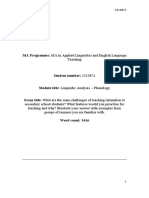Good and Bad
Good and Bad
Uploaded by
Dale CoulterCopyright:
Available Formats
Good and Bad
Good and Bad
Uploaded by
Dale CoulterCopyright
Available Formats
Share this document
Did you find this document useful?
Is this content inappropriate?
Copyright:
Available Formats
Good and Bad
Good and Bad
Uploaded by
Dale CoulterCopyright:
Available Formats
Have successfully adapted Form: Present Perfect tense.
( have)+ adverb+ past participle Meaning: The Present Perfect is used to describe actions started in the past and are ongoing. Pronunciation: /hvsksesfldptd/
Have successfully adapted Form: 3rd person plural- Present Perfect simple. Affirmative. Auxiliary ( have)+ adverb+ past participle (regular lexical verb). Meaning: The Present Perfect is used to describe actions started in the past with current relevance: the effects are the object of our attention. Pronunciation: /hvsksesfldptd/ is periodically closed to travel due to missile testing Meaning: Students might fail to recognize the cause/effect relationship between park closures and missile testing, i.e. due to+ noun (prepositional phrase); due to is more formal and less common than because of.
is periodically closed to travel due to missile testing Meaning: Students may fail to recognize the subject of the passive voice. Students might fail to recognize the cause/effect relationship between park closures and missile testing
Phonology: weak forms, and alternating weak/strong forms of Phonology: to. weak forms, and / alternating zperidklklzdt weak/strong forms of
trvldutumslte sti/ /
to.
Staffing Form noun Use: Indicates the amount of people available in the
zperidklklzdt trvldutumslt esti/ Staffing Form: Noun, uncountable, present participle of the verb staff Use Indicates the amount of people available in the staff (semantic field of the text); subject of the participle clause weather and staffing permitting.
You might also like
- Observation Instrument DRAFTDocument4 pagesObservation Instrument DRAFTChris Esson100% (3)
- Delta Module 1 Exam Report Dec 2008Document6 pagesDelta Module 1 Exam Report Dec 2008ClaudiaNo ratings yet
- Task 5 BadnaswersDocument1 pageTask 5 BadnaswersDale CoulterNo ratings yet
- Delta Module Two Teaching Assessment Criteria With Explanatory NotesDocument10 pagesDelta Module Two Teaching Assessment Criteria With Explanatory NotesAlexandra PantaziNo ratings yet
- Teachers of English To Speakers of Other Languages, Inc. (TESOL) TESOL QuarterlyDocument13 pagesTeachers of English To Speakers of Other Languages, Inc. (TESOL) TESOL QuarterlyРита100% (1)
- The Present Perfect Simple - Getting It Right With Pre-Intermediate LearnersDocument11 pagesThe Present Perfect Simple - Getting It Right With Pre-Intermediate Learnersm mohamedNo ratings yet
- CELTA Pre Interview Task 2020Document6 pagesCELTA Pre Interview Task 2020Phương VyNo ratings yet
- Damian Williams How To Pass Delta PDF Download EbookDocument2 pagesDamian Williams How To Pass Delta PDF Download EbookElvira Kraaijenbrink100% (1)
- Answer KeyDocument5 pagesAnswer KeyDale Coulter100% (2)
- Error CorrectionDocument1 pageError CorrectionDale CoulterNo ratings yet
- Answer KeyDocument5 pagesAnswer KeyDale Coulter100% (2)
- Task 4 - Paper One - Bad Key-1Document4 pagesTask 4 - Paper One - Bad Key-1Dale CoulterNo ratings yet
- Task 5Document2 pagesTask 5Dale CoulterNo ratings yet
- Task 3 AnswersDocument2 pagesTask 3 AnswersDale Coulter100% (1)
- Trinity Diploma Independent Research - Classroom DynamicsDocument9 pagesTrinity Diploma Independent Research - Classroom DynamicsChris EssonNo ratings yet
- Teaching Unplugged: Is Dogme An Innovation or A Remake?: Darío Luis Banegas University of Warwick, UKDocument9 pagesTeaching Unplugged: Is Dogme An Innovation or A Remake?: Darío Luis Banegas University of Warwick, UKDarío Luis BanegasNo ratings yet
- Emma Halliday LSA 2: Helping Learners Listen To Broadcast NewsDocument16 pagesEmma Halliday LSA 2: Helping Learners Listen To Broadcast NewsAhmed BelalNo ratings yet
- Cullen, R. (1994) - Incorporating A Language Improvement Component in Teacher Training Programmes.Document11 pagesCullen, R. (1994) - Incorporating A Language Improvement Component in Teacher Training Programmes.gabar.coalNo ratings yet
- Exam Practice A v4 PDFDocument1 pageExam Practice A v4 PDFGözde HanNo ratings yet
- Delta Module Three Principal Examiners Report June 2009Document20 pagesDelta Module Three Principal Examiners Report June 2009TonyNo ratings yet
- PG Cert ELT and Professional Practice/ Delta Lesson Plan: Commented (A1) : Please Refer To The File Named Syllabus'Document8 pagesPG Cert ELT and Professional Practice/ Delta Lesson Plan: Commented (A1) : Please Refer To The File Named Syllabus'Nguyễn Hoài Anh ThưNo ratings yet
- PPP Vs TBLDocument2 pagesPPP Vs TBLAndreas GavaliasNo ratings yet
- Delta M2 Application Form - Pre Interview TaskDocument18 pagesDelta M2 Application Form - Pre Interview TaskWalid Walid100% (1)
- IELTS Speaking Part 3Document17 pagesIELTS Speaking Part 3Yicheng JNo ratings yet
- SA102 10 AL-Madany Delta3 MON 0615Document39 pagesSA102 10 AL-Madany Delta3 MON 0615Raghdah AL-MadanyNo ratings yet
- Common Mistakes For Russian SpeakersDocument4 pagesCommon Mistakes For Russian Speakerskaghazade2018No ratings yet
- Key Terminology:: She Pin/binDocument5 pagesKey Terminology:: She Pin/binSamina ShamimNo ratings yet
- RPL Assignment 4 FullDocument10 pagesRPL Assignment 4 Fullrusiru_chitrasena7478No ratings yet
- Part 1 Genre AnalysisDocument16 pagesPart 1 Genre AnalysisdanizaNo ratings yet
- Celta Language Analysis Lesson PlanDocument1 pageCelta Language Analysis Lesson PlanviersiebenNo ratings yet
- Delta Module 1 June 2010 Paper 1 PDFDocument8 pagesDelta Module 1 June 2010 Paper 1 PDFGaby1503No ratings yet
- Exam Practice C (v1) P1 T3, P2 T3 FileDocument2 pagesExam Practice C (v1) P1 T3, P2 T3 FileNaserElrmahNo ratings yet
- Delta Module 1 Course and Exam Overview IH Guayaquil 1Document5 pagesDelta Module 1 Course and Exam Overview IH Guayaquil 1mohamed qutbNo ratings yet
- Gr108 Paraskevopoulos Internal Lsa2 BeDocument10 pagesGr108 Paraskevopoulos Internal Lsa2 BepanparasNo ratings yet
- Lesson Plan - Listening + CommentaryDocument7 pagesLesson Plan - Listening + CommentaryZeynep BeydeşNo ratings yet
- Combining Dictogloss and Cooperative Learning To Promote Language LearningDocument15 pagesCombining Dictogloss and Cooperative Learning To Promote Language LearningEmily James100% (1)
- CELTA 5 TemplateDocument19 pagesCELTA 5 TemplatearifulalamNo ratings yet
- Maram Mostafa Assignment 4 CELTA 2017 Me and TeachingDocument3 pagesMaram Mostafa Assignment 4 CELTA 2017 Me and TeachingMaram MostafaNo ratings yet
- Eva 14 Backwash EffectDocument7 pagesEva 14 Backwash EffectEduardo GiordaninoNo ratings yet
- Review of From Rules To Reasons by Danny Norrington-Davies (Pavilion 2016)Document3 pagesReview of From Rules To Reasons by Danny Norrington-Davies (Pavilion 2016)DeisyNo ratings yet
- Helping Intermediate Learners With Multiword VerbsDocument22 pagesHelping Intermediate Learners With Multiword VerbsMattFlemingNo ratings yet
- Lsa2 LPDocument20 pagesLsa2 LPKasia M100% (1)
- Peter Moor-A Task-Based ApproachDocument6 pagesPeter Moor-A Task-Based Approach123sheonaNo ratings yet
- Needs Analysis Is Dead Long Live Needs Analysis! IDocument8 pagesNeeds Analysis Is Dead Long Live Needs Analysis! ITamara KarpenkoNo ratings yet
- D8 Lexis Focus Teaching AssignmentsM2v2Document5 pagesD8 Lexis Focus Teaching AssignmentsM2v2Zulfiqar Ahmad100% (3)
- Delta Pre-Interview Task ApplicationDocument15 pagesDelta Pre-Interview Task ApplicationEdman HuseynNo ratings yet
- Unit1 - Unit 1 Module One Standalone Exam Practice Paper 1 Task Four 12finalDocument2 pagesUnit1 - Unit 1 Module One Standalone Exam Practice Paper 1 Task Four 12finalmcgwart0% (1)
- Delta Module Three ELT Management Option Syllabus Specifications 2011 1Document4 pagesDelta Module Three ELT Management Option Syllabus Specifications 2011 1Marisa ConstantinidesNo ratings yet
- Pronunciation Pedagogy in English As A Foreign Language Teacher Education Programs in VietnamDocument17 pagesPronunciation Pedagogy in English As A Foreign Language Teacher Education Programs in Vietnamlimili1996100% (1)
- Helping Intermediate Learners To Develop Their Reading Proficiency Through InferencingDocument10 pagesHelping Intermediate Learners To Develop Their Reading Proficiency Through InferencingAhmed RaghebNo ratings yet
- M1 Focus On The LearnerDocument21 pagesM1 Focus On The LearnerMagdalena OgielloNo ratings yet
- Dogme 4Document4 pagesDogme 4daguiani mohamed100% (1)
- CELTA TP9 Cover SheetDocument1 pageCELTA TP9 Cover SheetMeriel RhodesNo ratings yet
- A Framework For The Implementation of Task-Based InstructionDocument26 pagesA Framework For The Implementation of Task-Based InstructionChu Hean OonNo ratings yet
- Listening LSA1 Background EssayDocument15 pagesListening LSA1 Background EssayBen Eichhorn100% (2)
- Teaching IntonationDocument16 pagesTeaching IntonationSerene Lai Woon MuiNo ratings yet
- Plagiarism A Guide For Delta Module Three PDFDocument12 pagesPlagiarism A Guide For Delta Module Three PDFSamina ShamimNo ratings yet
- Model ANswerDocument6 pagesModel ANswerMahgoub AlarabiNo ratings yet
- Second Language Writing Instruction in Global Contexts: English Language Teacher Preparation and DevelopmentFrom EverandSecond Language Writing Instruction in Global Contexts: English Language Teacher Preparation and DevelopmentNo ratings yet
- Peacebuilding in Language Education: Innovations in Theory and PracticeFrom EverandPeacebuilding in Language Education: Innovations in Theory and PracticeNo ratings yet
- Rethinking Your Rate - Some InsightsDocument4 pagesRethinking Your Rate - Some InsightsDale CoulterNo ratings yet
- Testing TerminologyDocument3 pagesTesting TerminologyDale Coulter75% (4)
- Testing TerminologyDocument3 pagesTesting TerminologyDale Coulter75% (4)
- Task 4 - A - PART F - KEY-1Document4 pagesTask 4 - A - PART F - KEY-1Dale CoulterNo ratings yet
- Task 4 - A - PART F - KEY-1Document4 pagesTask 4 - A - PART F - KEY-1Dale CoulterNo ratings yet








